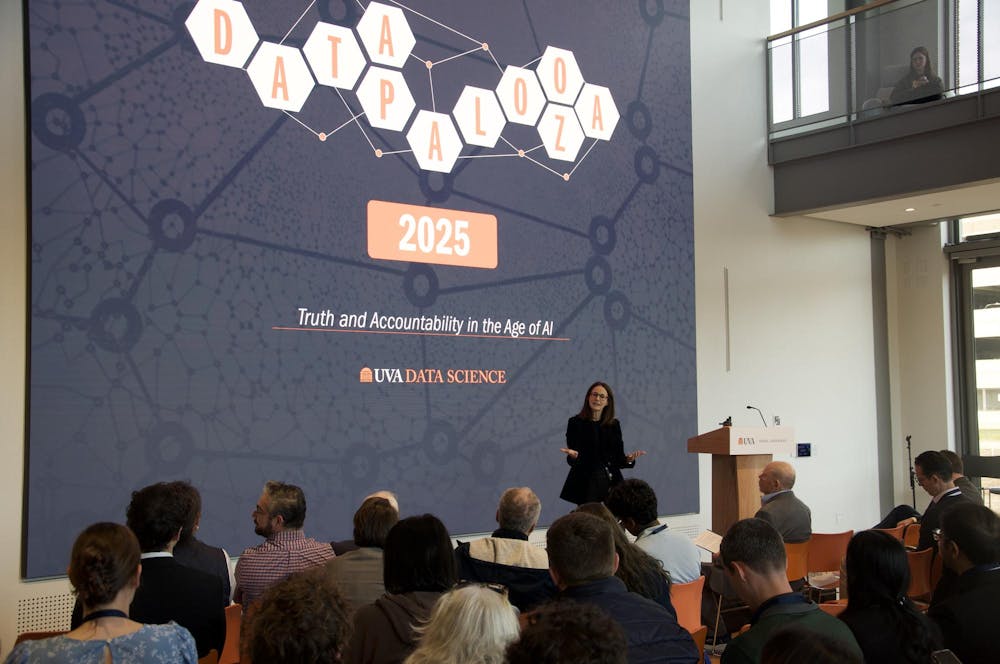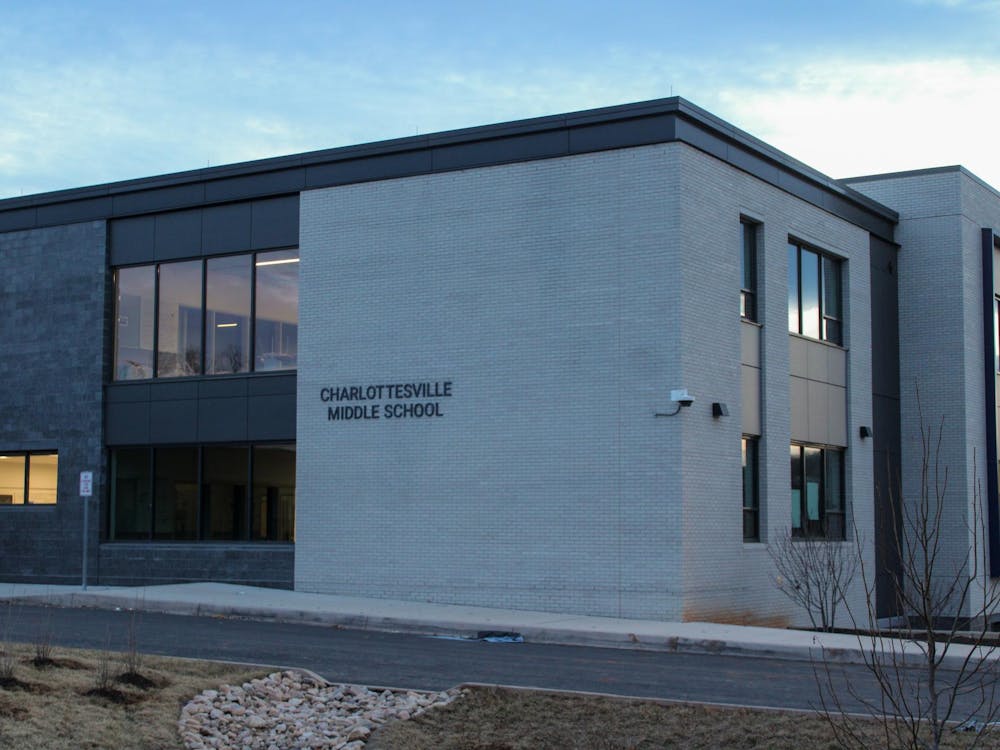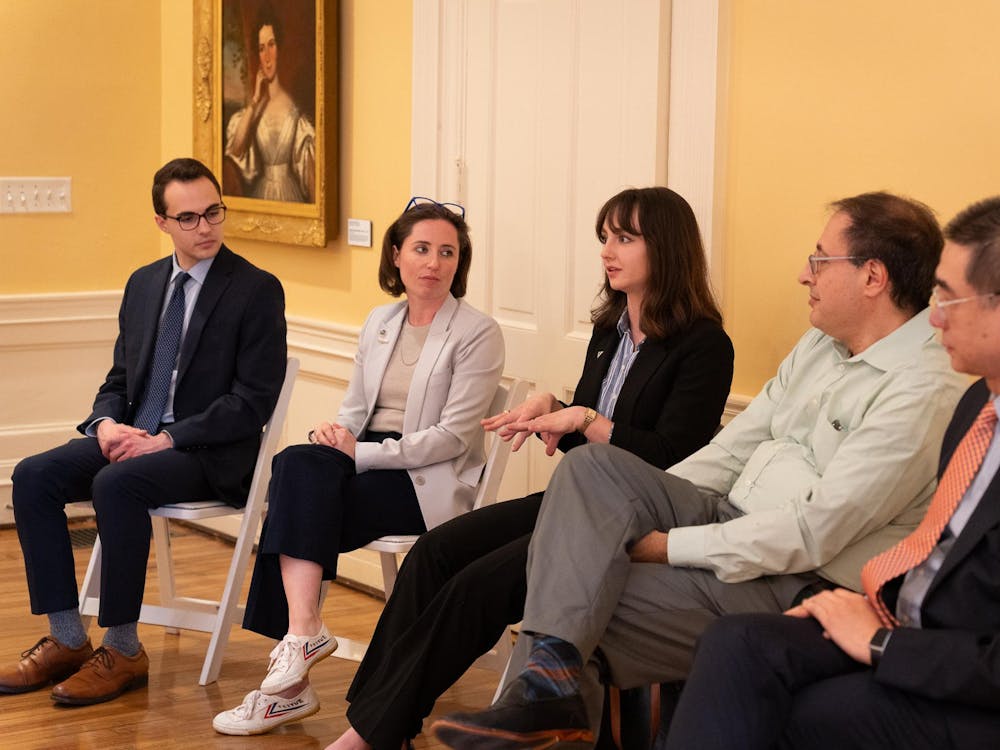The School of Data Science hosted its annual Datapalooza Friday, bringing together industry professionals and professors to share insights about the field.
Started in 2017, the yearly event focuses on highlighting research and industry developments in the field of data science across Grounds and aims to foster a collaborative environment across the field of data science. The event included keynote speakers and breakout panel sessions that covered a wide range of topics, including national security, health and culture.
Philip Bourne, Dean of the Data Science School and professor of biomedical engineering, gave opening remarks. He said that he sees data science and Datapalooza as solving real-world problems. Over 700 people signed up to attend in-person and virtually.
In his opening remarks, Bourne said that the birth of artificial intelligence has caused our society to evolve in new ways, and that AI could be the solution to challenges faced today, namely climate change.
“I see a paradox. AI can do good. It can do evil, but given the complexity of the problem we are trying to solve today, we cannot solve it without AI,” Bourne said.
Kelsey Campbell, a DC resident who works in the data science industry, was drawn to Datapalooza to learn more about the doctorate program at the University. She attended Datapalooza in 2019 and said that the event has since grown, expanding its horizon by becoming applicable to more disciplines than data science.
“I've been a fan of U.Va. just because of the ethical, responsible data science focus that they have,” Campbell said.
Danielle Citron, Jefferson Scholars Foundation distinguished professor of Law and the keynote speaker of Datapalooza, is a recognized law scholar in her field and previously served on the White House Gender Policy Council during the Biden administration. Citron spoke on how privacy laws are being weaponized to move America closer to authoritarianism. According to Citron, data-driven systems worsen inequalities, weaken trust in institutions and challenge the rule of law.
Citron drew connections between how China pressured Apple during the Hong Kong protests in 2019 and the U.S.’s crackdown on Apple amidst movements against Immigration and Customs Enforcement.
This year, U.S. Attorney General Pam Bondi successfully pressured Apple and Google to remove ICEBlock — an app that informs users of ICE presence within a 5-mile radius based on community reports — and other similar apps from their app stores. Citron said that the move parallels China’s request to Apple in 2019 to take down apps that tracked police activities and that the move was authoritarian.
In 2014, Citron was approached by a representative to write an anti-doxxing law. She believed then, as she believes now, that crafting anti-doxxing laws must be able to avoid infringement on people’s First Amendment rights. Citron said the American Civil Liberties Union argued against her proposed law in the name of First Amendment protection.
“When we weaponize the concept of privacy — the law of privacy — we undermine efforts to protect privacy in meaningful ways that people need right now, and we destroy what we've already achieved and have yet to achieve,” Citron said.
When it comes to drafting legislation about privacy and technology, Citron believes that it has to be technologically neutral, meaning not tied to any one device or technology. Even as technology continues to evolve, the laws should still be relevant and able to be used to protect privacy and people’s rights. She sees it as important to have people on Capitol Hill who are versed in technology and able to advise elected representatives and others on how best to implement effective legislation.
Brie Gertler, interim executive vice president and provost, closed the event by sharing how AI affects nearly every discipline, including research, teaching, learning, public service and clinical care. She said that she is launching a standing committee to look into the AI skills students will need, and she is also looking at how AI is shaping cognition and the role of AI in curriculum.
“We're now shifting to think more about, what is it that we want our students to learn about AI and what kinds of skills do we want them to have before they graduate?” Gerter said. “What will future employe[rs] expect our students to know when they graduate?”
Gertler said the University is part of a push to establish a statewide initiative between seven other public universities to be at the forefront of AI research, including its classroom application. Beyond partnering with other universities, the University will also work with private and government entities with the goal of training the workforce, accelerating research and deploying AI technologies.
Datapalooza also marked the kickoff of the 2026, LMI-U.Va. Data-to-Impact Challenge. The challenge is open to all University students and is a partnership between the SDS, LMI — a commercial grade technology provider — and the University’s National Security Data & Policy Institute. D2I encourages teams to utilize data science methods to explore the trade-offs and impacts associated with the growth of data centers. The registration deadline for the challenge is Dec. 5.
Breakout sessions at Datapalooza included “Data Science and National Security” and “Data Science and Health,” two sessions examining the intersection of data science and AI with innovation in those fields.
During one of the breakout sessions — “Data and Health” — speakers focused on how AI innovations are impacting the field of healthcare. Led by professionals in the field who work with the University or with U.Va. Health, they shared how they are utilizing AI to further healthcare efficiency.
“Data and National Security” was led by various industry professionals in Virginia who work in various fields that are connected by data science and government work, and they discussed how AI and data science will be needed to ensure that the U.S. stays competitive both from a military and a cyber security perspective.
Kris Miller, future graduate student in Data Science, came to Datapalooza to meet people he will be in the courses with. He found the breakout sessions very insightful and showed him how different fields are evolving.
“I stayed because it gave me an opportunity to see the wide array of work happening here. I attended the national security breakout session,” Miller said. “I currently work in federal service right now, so it's really nice to see some of the AI and machine learning applications in national security.”







